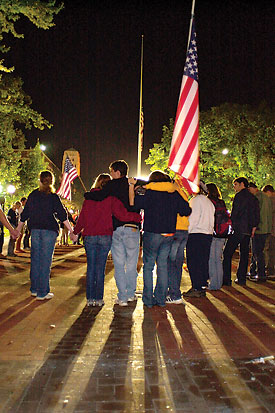On the 10th anniversary of the Sept. 11 terrorist attacks, some U-M faculty experts say the lasting impact on American society ranges from modest to profound, depending on the segment of society affected.
“We had not had a significant external attack on the U.S. mainland for at least a century. Even Pearl Harbor, which shook the country to its core in 1941, was off in Hawaii; 9/11 was here and now,” says Brian Zikmund-Fisher, assistant professor in the School of Public Health and research assistant professor in the Medical School, whose expertise is in risk perceptions and risk communication.

Members of the U-M community gather Sept. 11, 2001, on the Diag following terrorist attacks on the United States earlier that day. As the 10th anniversary approaches, faculty experts say the public continues to adapt to a loss of personal liberties, increased military spending and a sense that citizens always are at risk. Photo by Martin Vloet, U-M Photo Services.
The novelty of the Sept. 11 attacks made them particularly scary. “Very few people had imagined anyone using planes as suicide weapons, and thus no one had a sense of how likely this or other types of attacks would be. Could we stop them? No one knew,” Zikmund-Fisher says.
Americans have recovered from the initial anxiety and fear that followed the 9/11 attack, says Michael Traugott, professor of communication studies, LSA, and research professor, Institute for Social Research. “But our lives have been changed permanently in ways that complicate some people’s daily lives and raise the transaction costs of travel and doing certain kinds of business.”
“There are other less visible costs that we have paid in terms of increased government surveillance and some loss of personal liberties. These don’t manifest themselves in necessarily obvious and direct ways to the average citizen, but they also represent a collective social loss,” Traugott says.
Don Grimes, Center for Labor Market Research senior research area specialist, agrees that measures implemented after the Sept. 11 attacks have affected personal liberties. “The biggest impact was in two areas: inefficiencies caused by increased security — think of airport security screening and the lines crossing the border into Canada — and additional government spending on defense, including wars in Iraq and Afghanistan and homeland security,” he says.
Grimes evaluated the economic impact of the Sept. 11 attacks on Wayne County in a forecast prepared just weeks after the attacks, and correctly predicted the effect would be modest.
The Sept. 11 attacks created a major effort in the psychiatric community to plan more efficiently to treat emotional trauma, says Dr. Michelle Riba, professor of psychiatry and associate chair for integrated medical and psychiatric services; associate director of the Depression Center in the Department of Psychiatry, Medical School; and associate director of the Michigan Institute for Clinical & Health Research.
The attacks touched Riba’s family. Her sister Deborah Miron, a government lawyer, was working in the Pentagon on Sept. 11 but was physically unhurt in the attack. Her daughter’s sister-in-law died Sept. 11 as she was a flight attendant on the first plane that crashed into the World Trade Center.
“After 9/11, at the American Psychiatric Association we were asked for materials very quickly for children; that was a major focus for us and continues to be,” she says. “We’ve been asked for research documentation and clinical materials on all sorts of issues regarding post-traumatic stress; we recognize the importance of post-traumatic stress when examining such events as 9/11.”
The trauma eventually subsided. “One thing that I remember in the immediate aftermath of 9/11 is this line of reasoning that everything is different now. That was the case for maybe the first month. I think forever in popular culture is maybe a couple of months,” says Holly Hughes, professor in the School of Art & Design and professor of theatre and drama in the School of Music, Theatre & Dance.
Hughes says the initial national sense of trauma gave way to a militant patriotism, and a reassessment of what patriotism meant. “It was decided that we had to suspend certain civil liberties, that we were in a state of war with an enemy that’s all over the place, and being critical of the country was quasi-treasonous,” she says, adding the political division of red and blue states got sharper in the wake of 9-11.
Hughes finds it striking that few feature films about the Sept. 11 attacks have been released. “It was a national trauma. I think that the silence in pop culture about it is remarkable. I think it’s because the interpretation of 9/11 is so deeply divided,” she says.
In the arts community, Hughes says 9/11 set off a chain of economic events that impacted museums, galleries, theaters and performance spaces. “Ten years later most of the American cultural institutions are hanging on by a thread economically. Of course, artists are also affected,” Hughes says.
For those who lived through Sept. 11, there is one lasting impact, Zikmund-Fisher says: “9/11 forced most of us to grapple with the reality that we are always at risk. The fact that such events are highly unlikely does not matter. As a result, we don’t try to minimize risk, we try to eliminate it. I think 9/11 has left many Americans striving to restore a sense of safety that is now gone.”

